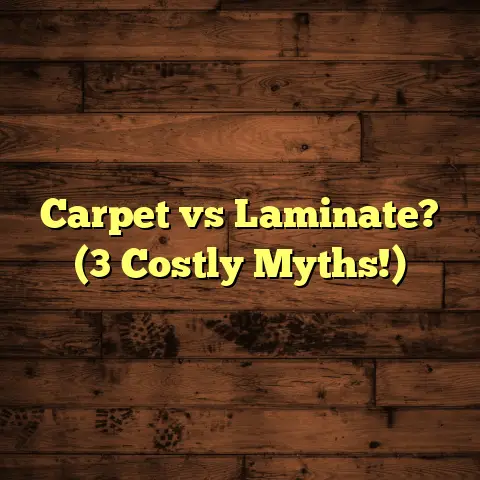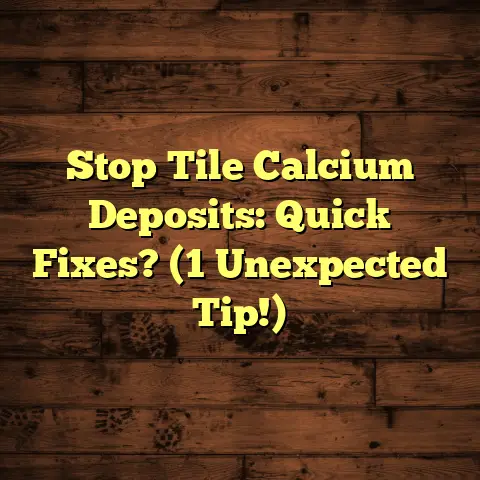Dog Pee Smell in Hardwood: Fix It! (1-Hour Odor Fix)
Do you remember the first time you brought your furry friend home, excited to create memories together?
I bet you do.
It’s a special moment. But the joy of their companionship sometimes comes with its own set of challenges, like unexpected accidents on your beautiful hardwood floors.
Believe me, I’ve been there. As a flooring contractor for over 15 years, I’ve seen it all. And I’ve helped countless homeowners just like you deal with this exact problem.
Let’s get your floors smelling fresh again.
Section 1: Understanding the Problem
The Nature of Dog Urine
Dog urine isn’t just water; it’s a complex cocktail of waste products, including urea, uric acid, creatinine, electrolytes, and various toxins.
Think of it like this: it’s not just a little spill. It’s a mini-chemical experiment happening right on your floor!
The uric acid is the real culprit behind that lingering odor. It crystallizes and binds tightly to surfaces, making it incredibly difficult to remove with ordinary cleaners.
Even worse, these crystals can reactivate with humidity, meaning that the smell can come back even after you think you’ve cleaned it up.
Impact on Hardwood Floors
Hardwood, as beautiful as it is, is also porous. This means that liquids can seep into the wood fibers if the finish is compromised or if the accident isn’t cleaned up quickly enough.
Once urine penetrates the finish, it can soak into the wood itself.
This leads to staining and a persistent odor that seems impossible to get rid of. I’ve seen cases where the urine has even seeped down into the subfloor, requiring extensive repairs.
The finish on your floor is your first line of defense. But even the best finishes can’t withstand repeated or prolonged exposure to dog urine.
Think of it like sunscreen: it protects you from the sun, but you still need to reapply it regularly.
The Emotional Toll
Dealing with pet accidents can be incredibly frustrating. I understand the feeling. You love your dog, but you’re also proud of your home.
It’s tough when those two things seem to be at odds.
Many of my clients tell me they feel guilty or embarrassed about the smell. They worry about what guests will think, and they feel like they’re constantly battling to keep their home clean.
It’s completely understandable. You want a beautiful and welcoming home, and a lingering pet odor can really take a toll on that.
Section 2: Immediate Steps to Take After an Accident
Act Quickly
Time is of the essence! The longer urine sits on your hardwood, the more likely it is to penetrate the finish and cause lasting damage.
Think of it like a stain on clothing: the sooner you treat it, the better the chance of removing it completely.
According to a study by the National Wood Flooring Association (NWFA), immediate cleanup can significantly reduce the risk of permanent staining and odor.
I always tell my clients: “Don’t wait, wipe!”
Blotting vs. Rubbing
This is crucial: never rub the urine. Rubbing will only spread the stain and force the urine deeper into the wood fibers.
Instead, blot the area with paper towels or a clean cloth. Apply firm pressure to absorb as much liquid as possible.
Change the paper towels frequently until you’re no longer picking up any moisture.
Imagine you’re trying to soak up a spill with a sponge. You wouldn’t rub the sponge around; you’d press it down to absorb the liquid.
Initial Cleaning Agents
After blotting, you can use some common household items to help neutralize the smell temporarily.
-
Vinegar: Mix equal parts white vinegar and water in a spray bottle. Spray the affected area and let it sit for a few minutes before blotting it up. Vinegar is a natural deodorizer and can help break down the uric acid in the urine.
-
Baking Soda: Sprinkle baking soda generously over the affected area. Let it sit for several hours or even overnight. Baking soda is excellent at absorbing odors. Vacuum it up thoroughly.
These are temporary fixes, mind you. They’ll help reduce the smell, but they won’t completely eliminate it, especially if the urine has already penetrated the finish.
Section 3: The 1-Hour Odor Fix
This is my go-to method for tackling fresh urine stains and odors. It’s quick, effective, and uses products that are readily available.
Gather Necessary Supplies
-
Enzymatic Cleaner: This is the key ingredient. Enzymatic cleaners contain enzymes that break down the uric acid crystals, eliminating the source of the odor. Look for a cleaner specifically designed for pet urine.
-
Paper Towels or Clean Cloths: You’ll need plenty of these for blotting and wiping.
-
Spray Bottle: For applying the enzymatic cleaner.
-
Bucket: For mixing the cleaner with water.
-
Warm Water: For diluting the cleaner and rinsing the area.
-
Mop (Optional): For larger areas.
Pro Tip: Always test the cleaner in an inconspicuous area first to make sure it doesn’t damage the finish.
Step-by-Step Guide
Step 1: Blot the Area Thoroughly
As we discussed earlier, the first step is to blot up as much urine as possible with paper towels or a clean cloth.
Apply firm pressure and change the towels frequently.
Step 2: Dilute the Enzymatic Cleaner
Follow the manufacturer’s instructions for diluting the enzymatic cleaner with water.
Most cleaners recommend a dilution ratio of 1:1 or 1:2 (cleaner to water).
Step 3: Apply the Cleaner Generously
Pour the diluted cleaner into a spray bottle and spray the affected area generously. Make sure to saturate the area, but don’t soak it to the point where water is pooling on the floor.
Let the cleaner sit for the recommended time. This is usually 5-10 minutes, but check the product label for specific instructions.
Step 4: Wipe Away the Cleaner
Use a clean cloth or mop to wipe away the cleaner.
Step 5: Rinse and Dry
Rinse the area with clean water to remove any remaining cleaner residue.
Dry the area thoroughly with a clean cloth or towel. You can also use a fan to speed up the drying process. Moisture is the enemy of hardwood, so it’s important to get it completely dry.
Important Note: Some enzymatic cleaners are “no-rinse” formulas. Check the product label to see if rinsing is necessary.
Section 4: Preventative Measures for the Future
Prevention is always better than cure. Here are some things you can do to prevent future accidents and odors.
Training Your Dog
House training is the most effective way to prevent accidents. Establish a regular potty schedule and take your dog outside frequently, especially after meals and naps.
Reward your dog with praise and treats when they eliminate outside.
If your dog is having accidents indoors, consult with a veterinarian to rule out any underlying medical conditions.
According to the American Veterinary Medical Association (AVMA), consistent training and positive reinforcement are key to successful house training.
Protective Finishes
Applying a protective sealant to your hardwood floors can help prevent future odors from permeating the wood. Look for a sealant specifically designed for hardwood floors that is resistant to water and stains.
I typically recommend polyurethane finishes for high- traffic areas and homes with pets. They provide excellent protection against scratches, stains, and moisture.
Regular Maintenance
Regular cleaning can help keep your hardwood floors fresh and odor-free. Sweep or vacuum regularly to remove dirt and debris.
Mop your floors with a hardwood floor cleaner according to the manufacturer’s instructions. Avoid using harsh chemicals or abrasive cleaners, as these can damage the finish.
I advise my clients to clean their floors at least once a week, or more often if they have pets or children.
Section 5: When to Seek Professional Help
Sometimes, despite your best efforts, the odor persists. Here’s when it’s time to call in the pros.
Identifying Severe Damage
If the odor is persistent, even after multiple attempts to clean it, it may indicate deeper issues within the flooring.
Look for signs of:
- Dark Stains: These indicate that the urine has penetrated deep into the wood.
- Cupping or Buckling: This can be caused by excessive moisture from the urine.
- Soft Spots: These indicate that the wood is rotting.
If you notice any of these signs, it’s important to consult with a professional flooring contractor or restoration service.
Consulting Professionals
A professional cleaning or restoration service has the equipment and expertise to remove stubborn odors and repair damaged hardwood floors.
When choosing a professional, look for:
- Experience: Choose a company with a proven track record of success.
- Certifications: Look for certifications from organizations like the NWFA.
- References: Ask for references from previous clients.
Important Question: Don’t hesitate to ask about their methods for removing pet odors and restoring hardwood floors. A reputable company will be happy to explain their process and answer any questions you may have.
Conclusion: Reaffirming the Bond with Your Pet
Accidents happen. It’s part of life, especially when you share your home with a furry friend.
But the love and joy that dogs bring into our lives far outweigh the challenges.
With the right knowledge and tools, you can tackle even the most stubborn pet odors and keep your hardwood floors looking and smelling their best.
Embrace the journey of pet ownership, armed with the knowledge to tackle one of the common hurdles of having a furry friend.
Remember, a clean home and a happy pet can coexist.





